| Pear-fruited mallee, Dowerin rose | |
|---|---|
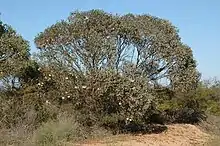 | |
| Eucalyptus pyriformis near Three Springs | |
| Scientific classification | |
| Kingdom: | Plantae |
| Clade: | Tracheophytes |
| Clade: | Angiosperms |
| Clade: | Eudicots |
| Clade: | Rosids |
| Order: | Myrtales |
| Family: | Myrtaceae |
| Genus: | Eucalyptus |
| Species: | E. pyriformis |
| Binomial name | |
| Eucalyptus pyriformis | |
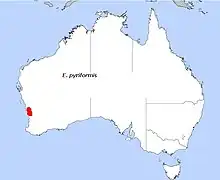 | |
| E. pyriformis, field distribution | |
| Synonyms[1] | |
|
Synonyms
| |
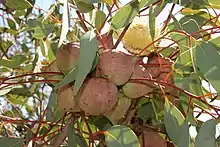
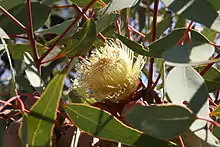
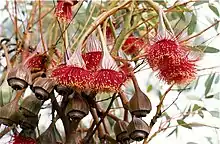
Eucalyptus pyriformis, commonly known as pear-fruited mallee or Dowerin rose,[2] is a species of low, straggly mallee that is endemic to Western Australia. It has smooth greyish brown bark sometimes with ribbony bark near the base, egg-shaped to lance-shaped adult leaves, flower buds in groups of three, red, pinkish or creamy white flowers and down-turned, conical fruit with prominent ribs.
Description
Eucalyptus pyriformis is a straggly mallee that typically grows to a height of 1.5–5 m (4 ft 11 in – 16 ft 5 in) and to a width of 3–6 m (9.8–19.7 ft) and forms a lignotuber. In nature, it tends to be multi-stemmed but in cultivation it is more likely to be single stemmed. The bark is smooth, grey or salmon-pink coloured, often shedding in ribbons at the base. Young plants and coppice regrowth have leaves that are arranged alternately, dull bluish green, egg-shaped to broadly lance-shaped, 40–70 mm (1.6–2.8 in) long and 30–45 mm (1.2–1.8 in) wide and petiolate. Adult leaves are the same shade of dull bluish or greyish green on both sides, egg-shaped to lance-shaped, 55–95 mm (2.2–3.7 in) long and 15–30 mm (0.59–1.18 in) wide, tapering to a petiole 10–30 mm (0.39–1.18 in) long. Mature buds are oval, 32–60 mm (1.3–2.4 in) long and 20–30 mm (0.79–1.18 in) wide with ribs on the sides and a beaked operculum. Flowering occurs between May and October and the flowers are red, pinkish or creamy white flowers. The fruit is a woody, pendent, conical capsule 25–40 mm (0.98–1.57 in) long and 30–55 mm (1.2–2.2 in) wide on a pedicel 15–60 mm (0.59–2.36 in) long and with prominent ribs on the sides.[2][3][4][5][6][7]
Taxonomy
Eucalyptus pyriformis was first formally described by the botanist Nicolai Stepanovitch Turczaninow in 1849 in the journal, Bulletin de la Société Impériale des Naturalistes de Moscou.[8][9] The specific epithet (pyriformis) is a Latin word meaning "pear-shaped".[10]
Distribution and habitat
Pear-fruited mallee grows in flat and gently undulating country between the Murchison River in the north and Dowerin, Goomalling and Cowcowing in the south.[2][3][5]
Ecology
The flowers of E. pyriformis provide abundant nectar and pollen as a food source for wildlife.[4]
Conservation status
This eucalypt is classified as "not threatened" by the Western Australian Government Department of Parks and Wildlife.[3]
Use in horticulture
Eucalyptus pyriformis is distinctive for its large, pendulous buds and spectacular coloured flowers.[7] It is sold commercially as tube stock or as seeds and is planted as an ornamental, as a light screen, habitat for birds and insects and as wind protection. It can tolerate drought and light frost, will grow in coastal or inland areas.[6]
See also
References
- 1 2 "Eucalyptus pyriformis". Australian Plant Census. Retrieved 7 December 2019.
- 1 2 3 Chippendale, George M. "Eucalyptus pyriformis". Australian Biological Resources Study, Department of the Environment and Energy, Canberra. Retrieved 7 December 2019.
- 1 2 3 "Eucalyptus pyriformis". FloraBase. Western Australian Government Department of Biodiversity, Conservation and Attractions.
- 1 2 "Pear–fruited Mallee Eucalyptus pyriformis" (PDF). Native Plants Notes. Kings Park & Botanic Garden. Retrieved 17 November 2017.
- 1 2 "Eucalyptus pyriformis". Euclid: Centre for Australian National Biodiversity Research. Retrieved 30 May 2020.
- 1 2 "Eucalyptus pyriformis Pear-Fruited Mallee". Plant Selector. Retrieved 17 November 2017.
- 1 2 Brooker, I. & Kleinig, D., Eucalyptus, An illustrated guide to identification, Reed Books, Melbourne, 1996
- ↑ "Eucalyptus pyriformis". APNI. Retrieved 7 December 2019.
- ↑ Turczaninow, Nicolai S. (1849). "Decas sexta generum plantarum hucusque non descriptorum adjectis descriptionibus specierum nonnullarum". Bulletin de la Société Impériale des Naturalistes de Moscou. 22 (3): 22. Retrieved 7 December 2019.
- ↑ Francis Aubie Sharr (2019). Western Australian Plant Names and their Meanings. Kardinya, Western Australia: Four Gables Press. p. 288. ISBN 9780958034180.